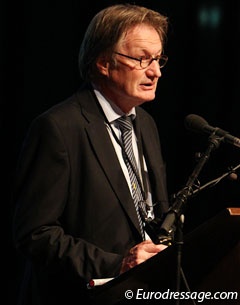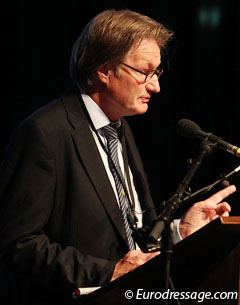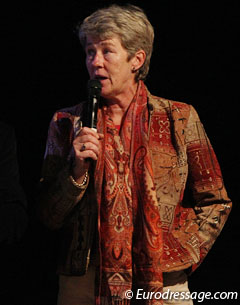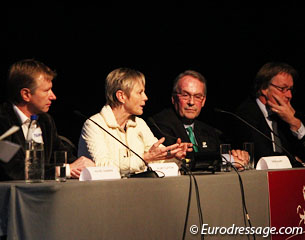
The Forum certainly kicked off with a bang. The opening session was supposed to be FEI Dressage Director Trond Asmyr talking about the work done by the FEI Dressage Committee (DC) over the past year. However, as Asmyr got a rain check for being ill, DC chair Frank Kemperman stepped up the plate to face the music.
With the blood rule being the hottest topic of the moment, everybody was bracing themselves to hear Kemperman speak on the matter. The Belgian based Dutchman, who is also show director of the biggest equestrian event in the world, the CHIO Aachen, seemed full of anticipation when he stepped up to the podium, as if he were walking to the gallows.
Davison, who moderates the forum each year, said that Kemperman is “the man who holds the power of dressage in his hands.” Then he asked the audience, “what have they been doing, are they communicating enough and is their new governance really working for you?"
With only a window of 15 minutes to speak Frank had to rush through the long list of decisions and changes the DC made in 2011, many of which were fantastic ideas that are pushing the sport forwards in the right direction: the half-point system, the Judging Supervisory Panel, seven judges at championships, the coaching of judges, the appointment of an FEI Judge General as spokesperson for the judges. Also the helmet rule is up for approval at the FEI General Assembly in November. It states that all riders over 18 years, riding on horses older than 7, should use a tophat/bowler and all others should wear a helmet at FEI shows.
Frank also touched upon some great work in progress: the new FEI pony tests, the degree of difficulty for the freestyles, an online education system for judges and officials, the creation of a dressage nations' cup series as well as the development of a long-term strategy paper which will analyse where we "will go with dressage in the next ten years. What is the future of dressage?"
The establishment of the shortened Olympic Grand Prix Special (effective as of 1 October 2011 and created due to demands of television) generated lukewarm response from the riders. "After London we'll review what is the best for the future. It's much too early to discuss it. After London we can discuss again," Kemperman said.
To Bleed or Not to Bleed
 And then came the mention of the "Blood Rule", a term disliked by Kemperman. He made clear that the rule does not only involve blood in the mouth, but all over the horse's body. Frank addressed the issue as following with staccato sentences: "We, the Dressage committee, we want no blood in the arena. We also learnt there is no rule at the moment. We all know what happened at Kentucky. We need a rule for it. (...) For that reason we took over the proposal of the IDTC. For main events, Olympic Games, major championships, there you will have the possibiity for re-examination at top events. Let the expert look at the horse. (...) If it is a minor issue the horse should have the possibility to start again. The same rule as when there is a problem with the music. We think it is the best for the sport."
And then came the mention of the "Blood Rule", a term disliked by Kemperman. He made clear that the rule does not only involve blood in the mouth, but all over the horse's body. Frank addressed the issue as following with staccato sentences: "We, the Dressage committee, we want no blood in the arena. We also learnt there is no rule at the moment. We all know what happened at Kentucky. We need a rule for it. (...) For that reason we took over the proposal of the IDTC. For main events, Olympic Games, major championships, there you will have the possibiity for re-examination at top events. Let the expert look at the horse. (...) If it is a minor issue the horse should have the possibility to start again. The same rule as when there is a problem with the music. We think it is the best for the sport."
Kemperman said that the initial proposal was sent to the 133 National Federations and only two nations expressed their position against it (most of them did not react). He also added that the proposal was already discussed with the stakeholders clubs.
Kemperman expressed his major disappointment in the clubs because they went to the media to out their viewpoint against the proposed blood rule. "We do not use the media to fight against each other," he declared. "What we have seen in the media is bad for our sport. I think it’s very stupid. I'm very disappointed that our own stakeholders started it."
The Public Image of the Sport
In his firm stand against the anti-blood rule campaign Kemperman added that "the image of the sport is very important. What is best for the sport, what is best for the horse! We shouldn’t be emotional and misuse this. We have to take wise decisions."
As a conclusion of his speech, Frank summarized that "Dressage is moving. It’s fun to work in dressage. We had a fantastic year, new names in the sport, new names, new winners. We have to do everything possible to bring it positive into the media. The image of the sport is very important. We have to sell the sport to the public, media, sponsors. We have to stick together. We are not only deciding for the sport. What is the outside world thinking of our sport? We have to make dressage attractive for everyone."
Exactly with these words Kemperman exposed the impossibility of the proposed blood rule as itallows a bleeding horse to re-appear in the arena, exactly exposing to the general public that blood on a horse does not at all affect the animal welfare and is endorsed and treated as a futility by the FEI.
How democratic is the Dressage Committee?
 The first to rise and ask questions was Kyra Kyrklund, International Dressage Riders Club president. The Finnish legendary dressage rider took a firm stand against Kemperman's words and said that three stakeholders clubs (Riders, Judges, Dressage Event Organizers) had communicated with the DC on their posiion against the proposed rule, but the DC completely ignored them and decided on their own. It made her wonder how the individual DC members voted, especially considering that three out of six are representatives of the clubs who were against the rule.
The first to rise and ask questions was Kyra Kyrklund, International Dressage Riders Club president. The Finnish legendary dressage rider took a firm stand against Kemperman's words and said that three stakeholders clubs (Riders, Judges, Dressage Event Organizers) had communicated with the DC on their posiion against the proposed rule, but the DC completely ignored them and decided on their own. It made her wonder how the individual DC members voted, especially considering that three out of six are representatives of the clubs who were against the rule.
With a stuttering voice Kemperman replied, "we are working for the best of the sport. We have a different opinion. We thought it (the IDTC proposal) was the best for our sport. I'm not in the place to say who voted for what. The board decides. We hear all the voices."
By disregarding the opinion of the three stakeholder clubs (IDRC, IDOC, AIDEO) the FEI Dressage Committee exposed its lack of democracy in decision-making. The public, eyeball-to-eyeball interrogation between Kyrklund and Kemperman at the Forum continued when Kyra told Frank, "You showed that you don’t respect the clubs," to which kemperman replied, "we respect them sometimes."
Journalist Dirk Willem Rosie added that he thinks it is positive that rule changes are discussed out in the open and not behind closed doors, the preferred work method of the FEI. "It is nice this comes out in the opinion. Discussions take place in the open," said the Dutch journalist. "I can’t see what’s wrong with that. There is no reason to be disappointed with that. It's a very emotional world and public opinion is very emotional."
Kermperman answered briefly that "we discuss this internally."
Blood Rule, Hot Topic at the 2011 Global Dressage Forum
 In the afternoon the blood rule resurfaced in a panel discussion with Wayne Channon (IDRC secretary general), David Hunt (IDTC president) and Frank Kemperman at the discussion table.
In the afternoon the blood rule resurfaced in a panel discussion with Wayne Channon (IDRC secretary general), David Hunt (IDTC president) and Frank Kemperman at the discussion table.
Channon was asked to express the opinion of the IDRC on the blood rule. He said: "IDRC has a very clear view on this. We came to our conclusions, after looking at the logistics and the social impact. (...) If there is blood, the competition should finish. (...). The Trainers Club says a vet will inspect this and then a combination will go back in. We don't want that. What happens in the horse bleeds again? There are high-definition cameras everywhere. We have a blood sport! We don't want to risk that. It happens so rarely. There is one case in 10 years of championships."
David Hunt replied that, "we believe that blood on a horse is not necessarily a welfare issue. With any sign of blood the horse is stopped immediately and sent to an expert, a vet. The judge shouldn't be put in that position to make a decision. For all the work, effort, protection of the horse that we can put in horses, it can be dismissed out of question. Also with the vet check, it is sent to the holding box and inspected by a vet there."
Hunt seemed to have disregarded the fact that vet inspections at the beginning of the competition are usually done out of sight of the cameras and public scrutinity and most often vet checks are not even accessible by the press. In reaction to Hunt's statement a member of the audience stood up. This veterinarian said that "with the holding box, the horse will be re-examined by a different vet for a secondary opinion, but it is the Ground Jury (of judges) that makes the decision. It would be undue pressure on the veterinary delegates to switch the rule." Kemperman replied that the proposed blood rule had been approved by the FEI veterinary committee.
Dutch O-judge Wim Ernes said that he doesn't "like to take the decision to eliminate a rider because of blood. It's better to have an expert, a vet, look at the problem and give the rider the possibility to come in again. I support the proposed rule. I don't want to be put in that position to make the wrong decision." His stand in favour of the rule was surprising, especially considering that judges have the responsibility and are accountable for the thousands of points they give which determine the medals in a competition. Unfortunately moderator Davison did not ask O-judge Katrina Wust what her position was on the rule.
 Channon hit the nail on the head when he replied to Hunt, "you are giving a reason for the sport to be banned from the Olympics for a small issue."
Channon hit the nail on the head when he replied to Hunt, "you are giving a reason for the sport to be banned from the Olympics for a small issue."
Andrew McLean, former international eventing rider and animal behaiourist, replied: "it's not worth the risk at all (risk horse welfare, public perception). The welfare of the sport is put front with this rule. We can't afford this at all. Dressage is in everyone's living room in high definition. I can't believe it's even being discussed."
David Stickland, FEI Dressage score analyst, added, "the day that a horse has a problem, comes back in and the same thing happens again will mean you just killed your sport. It's an extreme pity that the question has been posed."
Political Overload
The politics and ego-combustion continued when the problem was addressed why the FEI Dressage Committee refused to recommend the IDRC selected rider representative to replace resigning rider rep Margit Otto-Crepin on the DC. Instead, the DC asked the National Federations for a candidate and ended up recommending a second, long-time IDTC member, Spanish Luis Lucio, for the position.
Channon, who was put forward by the IDRC for this position, commented: "The IDRC always had its nominee on the DC. The DC did not to take this nominee but went for a nominee by a national federation. Four members are nominated by national federations, 2 by their clubs (AIDEO, IDRC). Rider’s representative must be a member of the IDRC. The DC wants to choose the rider themselves. It's not ethical and to me not moral. Riders have one voice on the Dressage Committee. We should be able to select which voice on the committee. But to take someone who only joined a few weeks ago is not in the spirit of the sport."
Kemperman did not wish to comment on the issue. He said, "The riders are going to the FEI Tribunal with it."
Next Page of the report: Wolframm, Clayton, McLean: Where Science Becomes Knowledge
Text & Photos © Astrid Appels/Eurodressage.com - No Reproduction Allowed without permission
Eurodressage Coverage of the 2011 Global Dressage Forum